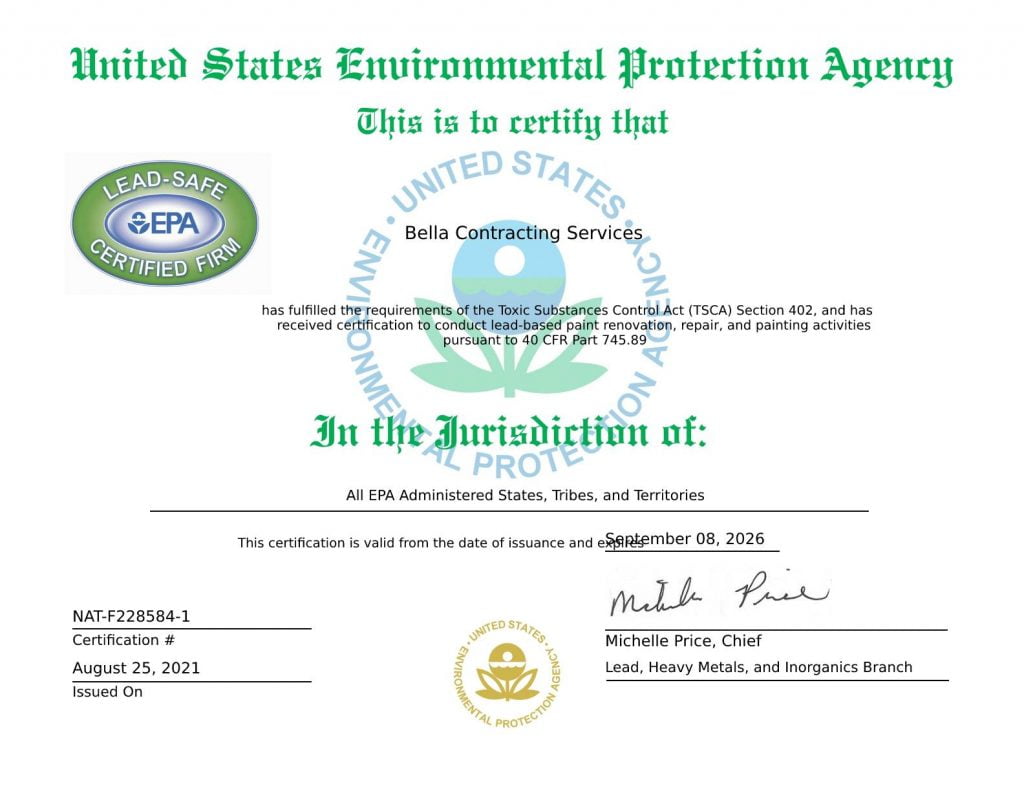Are you looking to navigate the complexities of hotel construction without drowning in unforeseen expenses? It starts with mastering your hotel construction cost planning and budgeting strategy. Direct and to the point, this article will distill the process into a financial blueprint that can anticipate and accommodate the multifaceted costs of hotel construction. Keep reading to understand what economic hurdles to expect and how to strategically vault over them to bring your vision to life, all while keeping your budget grounded.
Key Takeaways
- Hotel construction costs are influenced by numerous factors, including location, size, type, design complexity, and material choices, necessitating comprehensive feasibility studies and detailed budgeting to cater to each project’s specifics.
- The construction budget must be aligned with a hotel budget strategy, integrating precise cost estimation, market research to inform hotel type and size, strategic financial planning including forecasting and evaluating costs, and consideration for operational efficiency to optimize overall expenses.
- Managing operating costs and revenue projections is crucial for a hotel’s profitability, with emphasis on staffing and labor strategies, utility and maintenance efficiency, and investment in pre-opening marketing to ensure a successful launch and long-term success.
Understanding Hotel Construction Costs
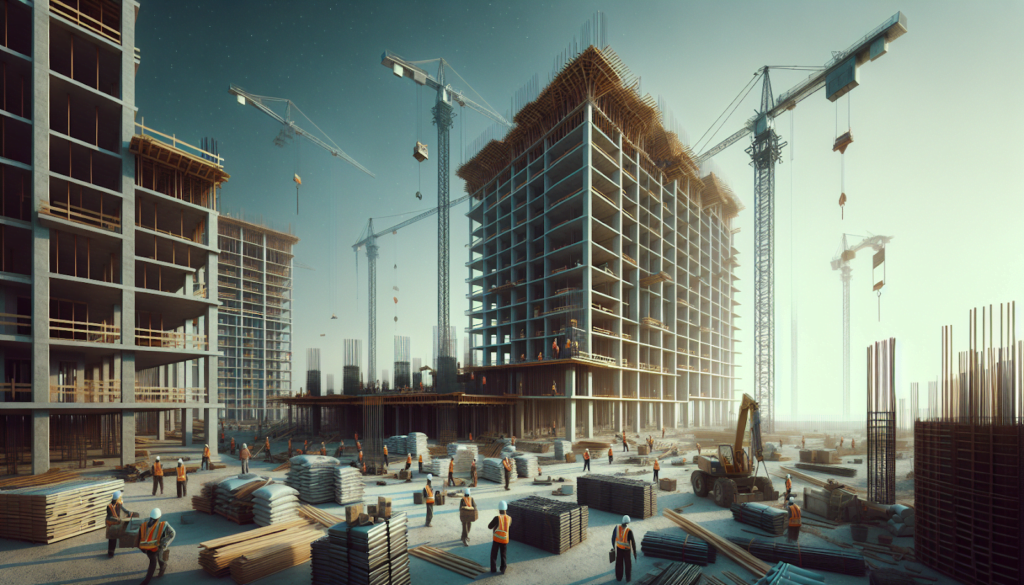

Like a puzzle with many pieces, a variety of factors influence hotel construction costs; each aspect plays a critical role in shaping the overall cost, from the hotel’s location to its size and type. However, the puzzle doesn’t stop there. External factors like labor costs, financing options, and market conditions can significantly swing the pendulum of your budget.
Feasibility studies prove valuable in understanding these fluctuations in construction costs. These studies shed light on the impact of various factors, such as:
- Location
- Hotel size
- Category
- Brand affiliations
When planning for hotel construction, a comprehensive hotel budget is essential to ensure a transparent cost estimate tailored to the specific project. This budget will serve as a roadmap, providing a detailed guide to the costs involved, including fixed costs, from materials and labor to machine costs and more.
Location Factors
Location, they say, is everything. In hotel construction, this certainly holds true. Land costs can range from $100K to millions, with variables such as proximity to popular attractions or amenities leading to increased value and, hence, elevated upfront hotel construction costs.
But it doesn’t stop at land costs. Labor costs, particularly in urban areas such as New York City, Los Angeles, or Miami, can be higher compared to rural or suburban locations due to increased demand for space and skilled workers. In competitive labor markets, labor costs could account for 20% to 40% of hotel construction costs. This necessitates thoughtful scrutiny of location factors during hotel construction planning.
Hotel Size and Type
Size does matter. So does the type of hotel. Building a 3-star hotel costs $190 to $375 per square foot, while a 4-star hotel costs between $260 and $410 per square foot. If you have your sights set on a 5-star hotel, the costs can soar even higher, averaging between $332 and $550 per square foot.
On the other hand, a motel, offering basic accommodations without the frills of higher-rated hotels, can be built from $160 to $240 per square foot.
Additional amenities such as:
- Swimming pools
- Spas
- Fitness centers
- Restaurants
can further heighten construction costs due to the extra space and specialized equipment required. Therefore, the size and type of the hotel considerably influence the overall financial planning for construction.
Design and Architecture Complexity
Just like a masterpiece painting, complex designs in hotel construction generally cost more to bring to life than simple designs. Expenses may increase for unique or intricate designs due to the need for specialized labor and materials.
The Terrace Bay Hotel, for instance, incorporated unique design elements like Ceilume ceiling tiles to give rooms an elevated and distinctive look. However, such design elements can have financial implications, highlighting the need to balance design complexity with budget constraints.
Materials and Finishes
The choice of materials and finishes plays a significant role in shaping hotel construction costs. High-end finishes and luxury materials like marble and hardwood tend to increase expenses. However, more basic material choices can help keep costs down.
Utilizing prefabricated bathroom pods and modular construction for guestrooms can reduce construction time and labor costs. The choice of furnishings also influences costs. For instance, furnishing costs for hotel rooms can range significantly from $2000 to more than $35,000 per room, influenced by the hotel category and the desired quality of furnishings.
Developing a Hotel Budget Strategy


After examining the factors that influence hotel construction costs, we can now delve into the process of developing a hotel budget strategy. This process encompasses:
- Precise cost estimation
- Market research
- Financial planning
- Enhancing operational efficiency
Selecting a hospitality case goods manufacturer within the hospitality industry that provides both manufacturing and installation can result in a cost savings of 5-10%. This underlines the importance of making strategic decisions during the budgeting process.
Market Research
Market research is pivotal in identifying the size and type of hotel that holds the greatest potential for success. Assessing market demand and researching competition can inform differentiation and competitive strategies.
However, market research is often overlooked by independent hotels due to budget constraints or a lack of expertise. Considering market research as an investment, not an expense, is critical given its potential to notably influence your hotel’s success.
Financial Planning
Financial planning serves as the foundation of a hotel construction project. It involves:
- Determining startup costs
- Predicting revenue
- Assessing operating costs
- Evaluating day-to-day expenses
- Calculating needed capital for both initial and ongoing operations
Financial planning, including capital expenditures, is key to the success of the project.
Financial forecasting includes key metrics such as:
- Property mortgages
- Insurance
- License fees
- Amortization of loans and assets
Revenue managers use these forecasts to inform departments about opportunities and initiatives, such as promotions during low-demand periods to attract different demographics.
Operational Efficiency
Operational efficiency is a linchpin in hotel budgeting. Integrating cloud-based Property Management Systems (PMS) can optimize:
- Reservation
- Check-in/out
- Housekeeping
- Maintenance tasks
Technologies such as beacon technology for mobile check-in and check-out can enhance the customer experience and reduce staffing needs at the front desk.
Operational forecasting for staffing can manage department-specific needs and adjust for seasonal variations, optimizing labor costs. Energy-efficient measures such as LED lighting can significantly cut energy usage, which reduces utility costs in hotels.
Managing Operating Costs and Revenue Projections
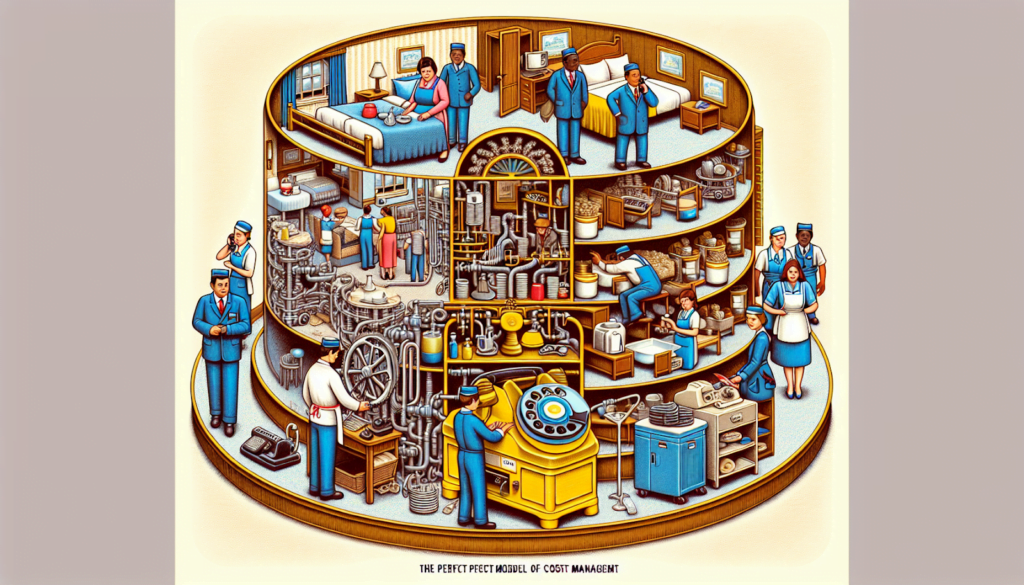

The old saying goes, “You need to spend money to make money.” In the hotel industry, the proficient management of operating costs and revenue projections is essential to guarantee profitability. From accurate hotel revenue forecasting to demand forecasting and implementing effective revenue management strategies, each aspect contributes to a hotel’s financial performance, including understanding how much revenue is generated.
Hotels situated closer to tourist attractions typically command higher room rates, increasing the justification for higher construction budgets aligned with projected revenues. Focusing on utility costs is also vital, as they are one of the fastest-growing operating expenses in hotels. Adopting energy-efficient strategies benefits both business finances and customer relations.
Staffing and Labor Costs
Staffing and labor costs form a significant portion of a hotel’s operating costs. However, strategies such as implementing a structured onboarding process and improving the hiring experience can significantly reduce employee turnover and associated costs.
Training staff not only bolsters operational efficiency but also enhances guest experiences, which helps reduce staff turnover. Cross-training employees provides operational flexibility and reduces the need to hire additional staff for specialized roles, leading to cost savings.
Utility and Maintenance Costs
Efficient hotel management of utility and maintenance costs can result in significant savings. Adopting energy and resource efficiency practices, like smart HVAC systems and low-flow fixtures, can lower hotel operational costs and lessen environmental impact. Installing LED lighting, occupancy sensors, energy-efficient kitchen layouts, and properly insulated pipes can significantly reduce electricity and heating bills.
Minor thermostat adjustments and careful control of heating and cooling systems can substantially save hotel utility costs. Regular maintenance of equipment and systems is also crucial to reducing energy consumption, prolonging equipment lifespan, and avoiding costly breakdowns.
Marketing and Pre-Opening Expenses
The costs related to marketing expenses and pre-opening activities are vital in determining a hotel’s successful launch. Marketing and pre-opening advertising, public relations, and other promotional activities must be factored into the budget.
Investments in strategic marketing, such as branding and promotions on social media platforms like Instagram, Facebook, and TikTok, can play a key role in building the hotel’s brand and attracting guests. To optimize the effectiveness of marketing strategies and associated budgets, hotels should combine secondary research with primary research to validate findings and prevent potential business failures.
Case Studies: Real-Life Examples of Hotel Construction Cost-Planning and Budgeting
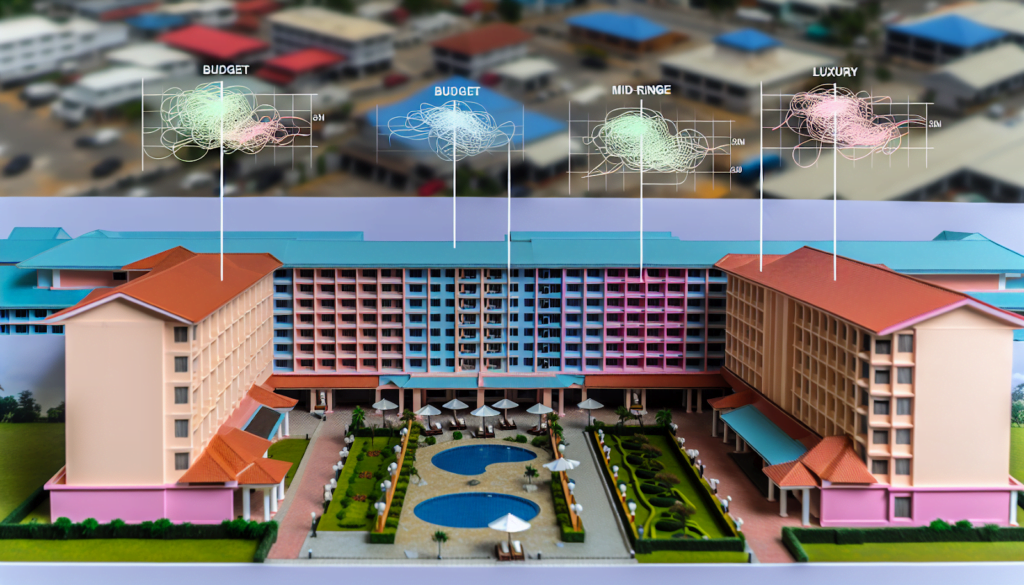

Case studies are a window into real-world applications of hotel construction cost-planning and budgeting. They provide practical examples, offering insights into effective cost-planning and budgeting strategies.
Budget Hotel Case Study
Take the case of the Moxy Hotel in San Diego, a budget hotel project that was carefully planned and executed with specific budget considerations. The project featured prefabricated elements, allowing for quicker assembly and reduced on-site labor costs.
Building Information Modeling (BIM) technology was utilized to enhance planning efficiency and facilitate better cost management. A value engineering approach was undertaken during the design phase, focusing on selecting cost-effective building materials and methods without compromising on quality.
The success of the Moxy Hotel illustrates the importance of meticulous planning and strategic decision-making in hotel construction.
Mid-Range Hotel Case Study
Another valuable case study is that of a mid-range hotel project. Here, meticulous budget allocation allowed flexibility for unexpected variable costs and ensured all areas of construction were adequately funded.
Having a contingency fund was a critical factor in managing unforeseen expenses during the hotel construction, ensuring that the costs were covered without compromising the project’s financial stability. The project’s success was evident in its ability to deliver a mid-range hotel that met market expectations while staying within the planned budget, primarily due to strategic planning and value engineering.
Luxury Hotel Case Study
The Four Seasons Hotel’s construction provides a fascinating look into the world of luxury hotel construction projects. The hotel utilized premium materials sourced globally, like Italian marble and Indonesian teak, enhancing the luxury atmosphere while substantially raising construction costs.
Total construction costs for extremely high-end hotels, such as the Four Seasons in New York, can reach approximately $1 million per room, indicating a significant investment in luxury development. Despite the high costs, the end result is a hotel that exudes luxury and comfort, attracting high-end clientele willing to pay premium prices for their stay.
Legal and Regulatory Considerations
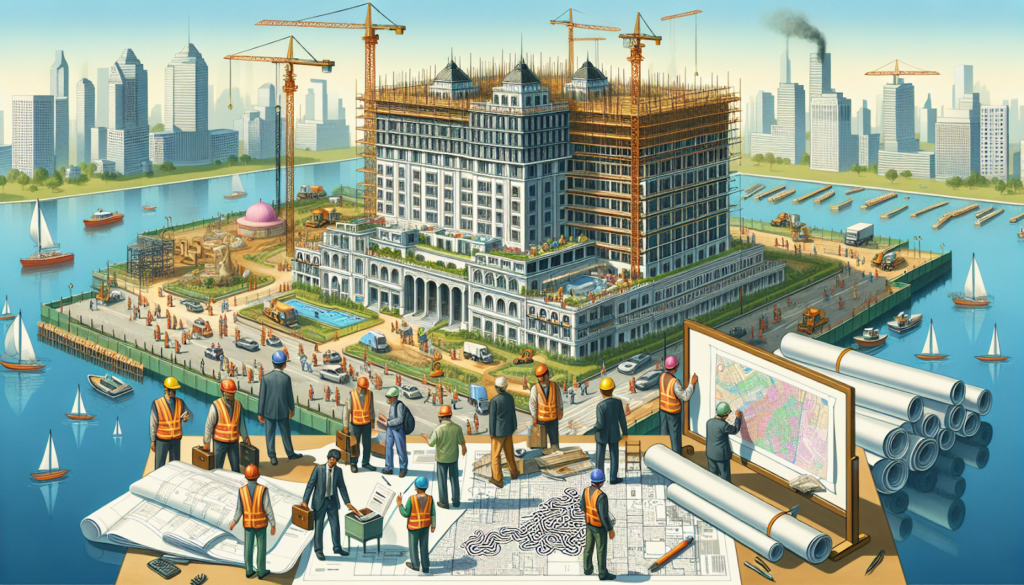

When planning a hotel, legal and regulatory considerations must be considered. Building permits are a vital part of the legal framework and require compliance with local zoning regulations.
Environmental regulations mandate hotel projects to take into account factors like water usage, energy efficiency, and waste management to minimize the environmental impact of the hotel’s construction and operation. Sustainable practices in hotel construction, including the use of eco-friendly materials and renewable energy sources, are essential to meet environmental compliance standards and can also lead to cost savings through operational efficiency.
Building Permits and Zoning Regulations
Building permits warrant that the hotel construction is legal and safe, adhering to codes to prevent structural and fire hazards. Hotels are generally placed under Commercial (C) zoning designations intended for business operations, and each zone has specific development regulations, including building size and parking space requirements.
It is recommended to consult with local zoning departments or land use attorneys to navigate potential challenges. Resources like ZoningPoint.com offer access to zoning maps and codes, providing a helpful guide in understanding zoning laws and securing building permits.
Environmental Compliance
Environmental compliance is not just a legal requirement, but it also plays a role in shaping a hotel’s reputation in the eyes of increasingly environmentally conscious consumers. Environmental certifications such as:
- Green Globe
- Green Seal
- Green Key Eco-Rating
- Audubon International’s Green Lodging
- Florida Green Lodging Program
recognize hotels for their commitment to sustainable practices and adherence to environmental standards.
These programs emphasize key sustainable practices such as water conservation, waste minimization, and energy efficiency to ensure hotels operate within environmental compliance frameworks. The ENERGY STAR program is specifically designed to promote energy-efficient products and practices in the hotel industry, further contributing to sustainable hotel construction and operations.
Summary
Navigating the labyrinth of hotel construction cost planning and budgeting is no easy task. But with a clear understanding of the key factors influencing hotel construction costs, a comprehensive budget strategy, and insights from real-life case studies, you’ll be well-equipped to master this complex process. Remember, building a hotel is not just about bricks and mortar; it’s about crafting an experience that begins with meticulous planning and ends with a sustainable, profitable business. If you’re planning the construction of a new hotel, you need an experienced construction company. You’ve probably tried searching terms like commercial construction near me or hotel contractors. End your search by contacting Bella Contracting Services to see how they can bring your project from concept to completion.
Frequently Asked Questions
How do you create a budget for a hotel?
To create a budget for a hotel, follow these seven steps: Gather data, identify revenue streams, analyze expenses, determine capital expenditures, set goals and objectives, allocate resources, and review and adjust.
How much does it cost to build a 100-room hotel?
Depending on the hotel’s standard, building a 100-room hotel can cost anywhere from $7.5 million to over $60 million. On average, a 3-star hotel with 100 rooms costs around $22.1 million.
How do you control a construction budget?
To control a construction budget, follow a step-by-step cost control process, including preliminary budgeting, detailed cost breakdown, cost tracking tools, regular expense monitoring, documentation, and communication. This will help you stay within your budget and manage costs effectively.
How does the location of a hotel impact construction costs?
The location of a hotel impacts construction costs through factors such as land costs, proximity to attractions, and labor expenses, which can vary based on the demand for skilled workers in the area.
What role do size and type of hotel play in construction costs?
The size and type of hotel have a significant impact on construction costs, with larger and higher-rated hotels typically involving higher expenses due to more refined requirements and additional amenities. Therefore, it is important to consider these factors when planning a hotel construction project.







